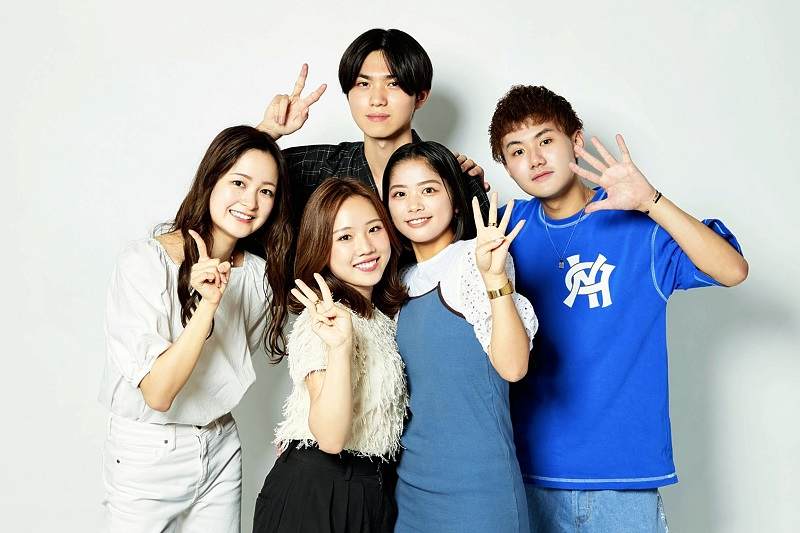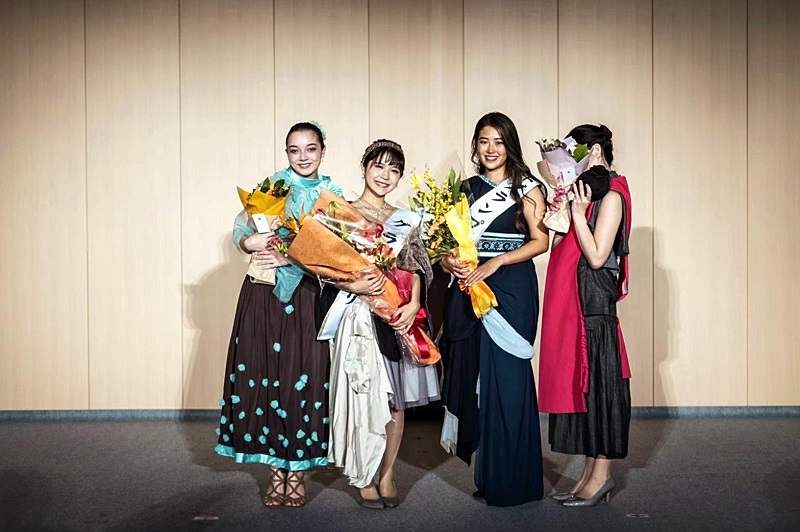
The five contestants in this year’s contest at Meiji Gakuin University
6:00 JST, September 15, 2022
University beauty pageants that used to choose the most attractive woman and man are starting to change amid growing criticism of lookism and gender-based stereotyping. There is now a growing movement to focus more on internal beauty and make such events gender-neutral.
However, there are also those who criticize ranking people according to their internal qualities. The search for a new style continues.
This school year, Meiji Gakuin University abolished the contests it used to hold separately for men and women. Until last year, women wore wedding dresses and men wore suits, and although some women emphasized their involvement in social activities, the voters tended to make their choice based on the contestants’ appearance.
“We were worried that the contestants’ messages wouldn’t get through in a format like that,” said Akane Miyata, president of the Meiji Gakuin University Advertisement Planning Team that hosts the contest.
This year, the two competitions are integrated, and the aim is to evaluate not appearances but contestants’ activities and skills.
“I want to promote Japanese culture through kenjutsu (traditional swordsmanship), which I’m good at,” one of the men competing said. A female student is emphasizing her activities to reduce plastic waste.
The final presentations will be made at the university festival in November, and the public will vote to determine the ranking. “We want to make this a lively event that showcases the students’ efforts,” Miyata said.
#MeToo
Sophia University was one of the first schools to move away from a pageant focused on appearances, revamping its Miss & Mr. contest into the “Sophian’s Contest” in 2020. The contest is not based on appearance for any gender —in 2021, one contestant did not show her face at all.

The four finalists in last year’s Sophian’s Contest at Sophia University. One contestant did not reveal her face.
The organizer of the Miss Campus Contest at Tokyo Woman’s Christian University has also announced on social media that it is reviewing the event.
One factor that has accelerated this trend is the #MeToo movement that began in the United States in the late 2010s.
Yuki Takahashi, 39, a part-time lecturer at Musashi University and an expert on gender issues, said beauty pageants became subject to criticism around that time. “Awareness of discrimination against women increased. Organizers worried that they would not be able to gain social support if the situation remained unchanged,” she said.
Judging people
However, there are also objections to the new types of contest. “Criticizing lookism is understandable, but if you rank people’s inner selves, isn’t that judging the people themselves?” asked Tetsuro Nobutoki, a professor at Konan Women’s University who studies women’s hobbies and consumption habits.
Misaki Ito, 21, a senior at Ochanomizu University, has spoken out against holding beauty pageants. “People may ultimately vote based on appearance. Judging their social activities is just a way to hide that truth,” Ito said.
In response to such objections, the Sophian’s Contest organizer said: “The contest draws public attention and is a powerful opportunity to promote student activities. We want to continue looking for an approach that will convince more people.”
Top Articles in Society
-

Producer Behind Pop Group XG Arrested for Cocaine Possession
-

Man Infected with Measles Reportedly Dined at Restaurant in Tokyo Station
-

Man Infected with Measles May Have Come in Contact with Many People in Tokyo, Went to Store, Restaurant Around When Symptoms Emerged
-

Woman with Measles Visited Hospital in Tokyo Multiple Times Before Being Diagnosed with Disease
-

Australian Woman Dies After Mishap on Ski Lift in Nagano Prefecture
JN ACCESS RANKING
-

Producer Behind Pop Group XG Arrested for Cocaine Possession
-

Japan PM Takaichi’s Cabinet Resigns en Masse
-

Man Infected with Measles Reportedly Dined at Restaurant in Tokyo Station
-

Israeli Ambassador to Japan Speaks about Japan’s Role in the Reconstruction of Gaza
-

Videos Plagiarized, Reposted with False Subtitles Claiming ‘Ryukyu Belongs to China’; Anti-China False Information Also Posted in Japan





















